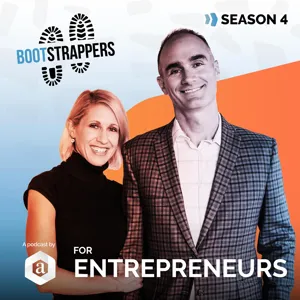Podcast Summary
Expertise from unconventional paths: Valuable insights can be gained from diverse experiences, including those outside traditional career paths. Forensic accounting plays a crucial role in uncovering deceit and fraud, and a multifaceted perspective is essential in complex business landscapes.
Expertise and experience, even those gained from unconventional paths, can provide valuable insights. Principal Asset Management showcases this through their global and local approach to real estate investing. Meanwhile, in the world of accounting, the story of Sam Antar, a former accounting expert turned fraudster and now back to being an accounting expert, highlights the importance of understanding the practices behind the theories. Forensic accounting, specifically, plays a crucial role in uncovering deceit and fraud. Anticipating potential issues and having the ability to spot unusual activities can make a significant difference. The intersection of real estate and accounting, as explored by Principal Asset Management and the Odd Lots podcast, demonstrates the importance of a multifaceted perspective in navigating complex business landscapes.
Criminals Running a Business: Crazy Eddy's Electronics Dealership: Criminals Eddie, Sam, and Ronnie Guindy built a successful electronics dealership by defying fair trade pricing and subsidizing discounts through tax fraud, starting in the late 60s.
Crazy Eddy's electronics dealership, which began as a single store retailer in 1969, was not an ordinary business. Its founders, Eddie, Sam, and Ronnie Guindy, were not businessmen who turned to crime, but rather criminals who ran a business. They thrived by defying "fair trade" pricing guidelines, which allowed larger retailers to compete through advertising budgets, and instead, offered discounts subsidized by skimming and stealing sales tax. This fraudulent business model came about through both planning and seizing opportunities. From the start, they intended to underreport income and steal sales tax due to the high sales tax rate and the predominance of cash sales. Over time, the fraud evolved, with one interviewee, Sam, starting at age 14 and contributing to the scheme. Despite the ease of lying without much digital interaction or trace back then, the fraud was eventually uncovered.
Education and Professional Credentials Don't Guarantee Fraud Prevention: Using education and certifications to commit fraud is possible, audits have limitations, and ethical behavior is crucial.
Having a good education and professional credentials, such as a CPA or CFA, does not make one immune to committing fraud. In fact, the speaker in this discussion used his accounting degree and CPA certification to perpetrate a multi-million dollar fraud scheme. He learned to take advantage of human nature, accounting rules, and the limitations of audits during his education and career. The speaker also mentioned that audits are not designed to find fraud and that most of the work is done by inexperienced auditors. He emphasized the importance of distraction in fraud schemes, suggesting that it's less risky to avoid having the auditor ask the right question than to lie. Overall, this discussion highlights the importance of ethical behavior and the limitations of relying solely on formal education and professional certifications to prevent fraud.
Crazy Eddie's Fraudulent Tactics: Crazy Eddie used attractive women, skimming, and going public to evade taxes and boost profits, creating an inflated market value.
During his time at Crazy Eddie from 1971 to 1984, the fraud department employed unconventional tactics to increase profits. One such tactic was the use of attractive women to distract employees, allowing them to overlook important order procedures. Another method involved reducing skimming and going public to show artificial growth, while using the skimmed money to overpay taxes, thereby creating inflated market value. The advertising strategy, which became synonymous with Crazy Eddie's, was the brainchild of Eddie himself. These unconventional methods allowed Crazy Eddie to evade taxes and boost profits significantly in their private years before going public.
Crazy Eddie's Ignored Criticisms Lead to Downfall: Refusal to address criticisms and investigations can lead to a company's downfall, even if the business model is successful initially.
Crazy Eddie's success was built on deep discounts and widespread advertising, but their refusal to address criticisms and investigations led to their downfall. The company, which had better name recognition than Coca-Cola at its peak, ignored a damning article in Barron's that raised concerns about the incestuous relationship between the business and related party entities, as well as the fact that key positions were held by relatives. These issues came to light when the company went public and could no longer skim sales tax, leading to losses and eventual takeover by a competitor. The plan was to go public, sell inflated stock, and then take the company private again, but the company was taken over before they could implement this plan. The house of cards came crashing down when the inventory was taken and found to be empty. Despite the potential for the business to work legitimately, the company's refusal to address criticisms ultimately led to its downfall.
The founders of Crazy Eddie sought a 'useful idiot' to take the company private due to poor business performance and hidden financial issues.: The founders of Crazy Eddie attempted to hide financial irregularities and poor business performance, leading them to seek a buyer to take the company private. However, they were ultimately outmaneuvered and the truth was revealed, resulting in a loss for all involved.
During the years leading up to Crazy Eddie's IPO, the company artificially inflated profits by reducing expenses. When the company went public, the founders had no incentive to take out profits, and the business trajectory was terrible. To take the company private, they needed a "useful idiot" with money to finance the worthless venture. Milton Petrie, a legendary retail investor, was approached but deemed inappropriate. Instead, Eddie came up with a bid of $7 a share, but it wasn't his money. Another public company, Entertainment Marketing, made a higher bid, and ultimately bought enough stock to vote out the founders at the annual meeting. Before this, the founders tried to dissuade them from buying the company but couldn't reveal the reason for their concern. After the takeover, the new owners discovered the fraud, and legal proceedings ensued. However, most of the documentation had been destroyed, making investigations challenging. The founders went from having a successful company to empty boxes, demonstrating the "winner's curse" where the winning bid always overpays.
The Importance of Preserving Documents in Investigations: The destruction or disorganization of crucial documents during investigations can hinder the pursuit of justice and make it difficult to piece together facts.
The destruction and disorganization of crucial documents during investigations can significantly hinder the progress of those investigations. This was evident in the Crazy Eddie case, where an entire warehouse of documents was mixed up, making it difficult for the SEC and investigators to piece together the facts. The speaker, a former executive involved in the case, realized this issue in 1989 when he was being set up by a different faction within the family. Despite his criminal background and lack of remorse, he eventually cooperated with the authorities to save himself. Today, the speaker acknowledges the importance of education, even if it was gained through criminal activities, and has used his knowledge to work for the government. The lesson here is that the destruction or disorganization of important documents can have serious consequences and hinder the pursuit of justice.
White collar crime's evolution and consequences: White collar crime is on the rise, with fewer prosecutions and jails leading to increased fraudulent activities. Intangible assets and manipulated reports pose significant risks.
While the methods of white collar crime have evolved, the prevalence and consequences of such crimes have changed as well. In the past, lies and deceit were more easily detected due to less complex financial systems. However, today's world values convenience and truth is often a matter of convenience for some. With fewer white collar criminals being prosecuted and jailed, the economic landscape has become ripe for fraudulent activities. Intangible assets, such as overvalued company assets, present a significant avenue for fraud. Furthermore, individuals should be wary of Wall Street research reports and financial statements, as they can be easily manipulated. Analysts may simply parrot management's information, and financial statements should be read from the end to the beginning, with a focus on footnotes and language changes. In essence, the ability to detect and prevent white collar crime has become increasingly important in today's complex financial landscape.
Manipulating Financial Statements: Companies can manipulate financial statements, particularly through VIEs and other methods, to inflate earnings. Fraud motivations and methods evolve, requiring vigilance and adaptability.
Financial statements, including the statement of cash flows, can be manipulated in various ways by companies, particularly through the use of variable interest entities and other methods. This manipulation can be more prevalent in public companies where the focus is on inflating public expectations of earnings rather than physically taking cash from the company. The motivations and methods of financial fraud evolve over time, making it essential to remain vigilant and adapt to new countermeasures. It is impossible to completely stop financial fraud, but we can try to manage, contain, and minimize it. The discussion also highlighted the importance of understanding the motivations behind fraud in different types of companies and the potential for fraud to go unnoticed for extended periods.
Stay Informed and Hold Accountable: Fraud and deception are common, but staying informed and holding individuals and organizations accountable is crucial. Regulators, auditors, and whistleblowers play important roles in uncovering fraudulent activities. Don't be afraid to try new things and stay updated on current events.
Learning from this episode of the Odd Lots podcast is that while fraud and deception may be prevalent in various aspects of life and business, it's important to stay informed and hold individuals and organizations accountable. Our guest, Sam Antar, shared his experiences and insights into accounting fraud and the importance of transparency. He emphasized the role of regulators, auditors, and whistleblowers in uncovering such fraudulent activities. On a lighter note, the podcast also featured an advertisement for Popeyes' new honey, lemon pepper wings, encouraging listeners to try something new and delicious. The overall message of the episode was to stay informed, hold those in power accountable, and not be afraid to try new things. If you enjoyed this episode, be sure to follow Tracy Alloway, Joe Weisenthal, Sam Antar, Topher Flores, Laura Carlson, and Franchesca Levy on Twitter for more insights and information. And don't forget to check out the American Express Business Gold Card for smart and flexible business solutions.





